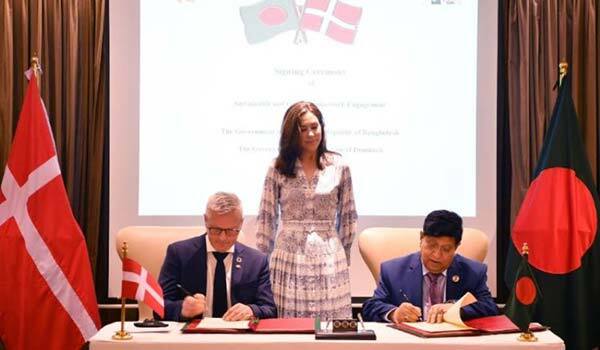|
Honourable Prime Minister Sheikh Hasina has reiterated that no one can stop the development of Bangladesh and that no citizen of the country will remain homeless or landless. Bangladesh would continue to march forward overcoming all obstacles in its path, she said while handing over semi-pucca houses to 32,904 families of 492 upazilas in the third phase of the Ashrayan-2 Project, just ahead of Eid-ul-Fitr. Breaking into tears of joy, one of the beneficiaries of the project, said the prime minister has given people of the third gender recognition as well as accommodation, before inviting her to visit the district on behalf of the 22 people of the community who got new homes. Another beneficiary wanted to give Sheikh Hasina two blankets sewn by her to express her gratitude.
|

|
|
HPM Sheikh Hasina said initiative has been taken to resume various cross-border routes between Bangladesh and India that were stopped in 1965, stressing the need for enhancing connectivity between the two countries for mutual benefits. The premier said this when Indian External Affairs Minister S Jaishankar paid a courtesy call on her at her official residence during a recent visit to Bangladesh. The envoy also stressed that Bangladesh features as the most important country in the Indian Foreign Policy objectives of "Neighbourhood First Policy", appreciating Bangladesh for the transformative socio-economic development under the dynamic leadership of HPM Sheikh Hasina.
|

|
HPM Sheikh Hasina said her government turned the state-run Bangladesh Railway into a profitable agency, mentioning that it was left in tatters during the previous BNP rule. The premier was addressing a programme marking the launch of two Bangabandhu Sheikh Mujib Mobile Rail Museums and 46 locomotives. The inauguration of new Bangladesh Railway locomotives is expected to significantly contribute to modernisation of Bangladesh railway system and improvement of connectivity and transportation in Bangladesh while this move will ultimately serve as a cornerstone of socio-economic development of the country. |

|
|
Bangladesh and Denmark last week signed a Framework Document on Sustainable and Green Engagement as the two countries shared a joint commitment to tackling global challenges like climate change and achieving the Sustainable Development Goals (SDGs). The signing took place during a recent visit to Bangladesh by Mary Elizabeth, the crown princess of Denmark as Foreign Minister A K Abdul Momen and Danish Minister for Development and Cooperation Flemming Moller Mortensen inked the document. The honoruable princess of Denmark also paid a call on with HPM Sheikh Hasina while the former also visited Rohingya refugee camps in Cox's Bazar to observe the condition of people living at camps.
|

|
|
Bangladesh has set a target to eliminate malaria from the country by 2030 as the annual malaria infection rate has declined by 94% over the space of last thirteen years under the able leadership of HPM Sheikh Hasina. According to media reports, a plan is underway to declare 51 more upazilas as free from malaria by 2023 while as many as 51 districts of the country have already got rid of that mosquito borne disease. Thanks to the successful introduction and implementation of a National Strategic Plan 2017-2021, a significant drop has been witnessed given that the total number of cases went down to 6,130 in 2020 in comparison with a whopping 84,690 cases registered in 2008.
|

|
|
Bangladesh has witnessed a steady growth in inward remittances with expatriates sending more money to their families ahead of the upcoming Eid. As of April 21, the inflow has increased to stand at $1.40 billion owing to a timely government scheme offering cash incentive to remittance senders. Under the prudent leadership of HPM Sheikh Hasina, the government has increased the cash incentive for remittances from 2% to 2.5% aiming to legal channels for money transection from overseas. About 10 million expatriates living in different countries play an important role in the country's economy by sending remittances as remittances account for 12% of the total GDP. The country received $22.07 billion in remittances in 2021, which was more than that in any other year in the history of Bangladesh.
|

|
Bangladesh is becoming a major manufacturer of sleeping bags as China is losing its market share because of worker shortage and higher cost of production. The production of sleeping bags in Bangladesh is gaining ground as the country is increasingly turning into a strong player in the production of outerwear such as jackets, tents, skiing wears, sportswear, hunter wears, safety wears and rain wears. Outerwear shipment fetches nearly $4 billion annually for the country and a good portion of the earnings comes from the exports of sleeping bags. But even a few years ago, two or three multinational companies, located in the export processing zones under the Bangladesh Export Processing Zones Authority, used to produce sleeping bags.
|

|
|
An initiative has been underway to set up training and incubation centers for IT training across the country with the aim of transforming the communication technology sector into one of the driving forces of the country’s economy. This effort coincides with the Awami League led government’s pledge to transform the country’s economy into a technologically advanced one. Currently, a number of initiatives have been taken to build knowledge-based human resources. Moreover, so far 39 high-tech IT parks have been set up in the country while works for setting up software technology, IT business, and training and incubation centers have also been completed in seven places.
|
|
|
|
|
|
|
|
|